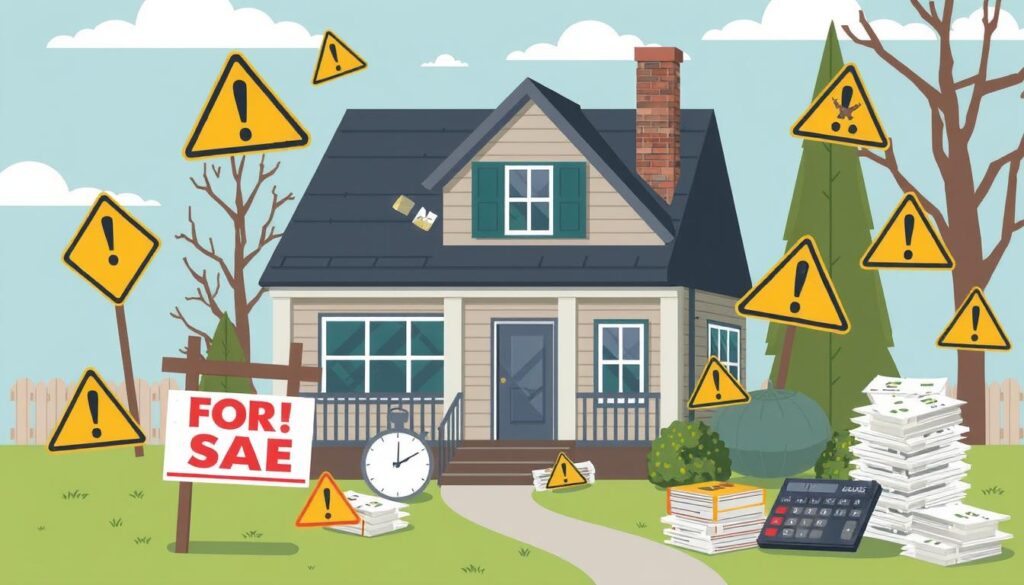Ever thought about selling your house for less than what you owe on the mortgage? It might seem like a bad move, but it’s actually a smart choice for some. A short sale lets homeowners sell their homes for less, avoiding the harsh effects of foreclosure. This guide will help you understand short sales, their benefits, and how they can help in tough financial times.
Key Takeaways
- A short sale allows homeowners to sell their property for less than the mortgage balance.
- The process typically requires lender approval, making it necessary to navigate through significant paperwork.
- Short sales can mitigate credit damage compared to foreclosure, offering a chance for future homeownership sooner.
- Understanding key features and requirements can empower sellers to make informed decisions.
- Consulting with professionals is crucial to effectively navigate the complexities of a short sale.
Understanding Short Sales
A short sale happens when a house is sold for less than what’s owed on the mortgage. This can be due to bad market conditions or financial troubles for the homeowner. Knowing about short sales is key for sellers and buyers, as these deals need lender approval.
Definition of a Short Sale
A short sale means selling a home for less than the mortgage debt. For example, if a home is worth $150,000 but the mortgage is $200,000, the lender must agree to the sale. This leaves a debt that the lender might forgive or go after legally.
Key Characteristics of a Short Sale
Short sales have some key traits:
- The sale needs lender approval, unlike regular sales.
- It’s a choice by the homeowner, unlike foreclosure.
- It might not wipe out the remaining mortgage debt.
- The process is long, needing lots of paperwork and months to complete.
- Short sales can hurt credit less than foreclosure.
Short Sale What Is It
It’s key to know about short sales if you’re struggling financially. Spotting early signs of trouble can help avoid foreclosure. Signs include missed payments, job loss, or big medical bills. If you owe more than your home’s worth, a short sale might be a good choice.
Financial Distress Indicators
Watch for signs that might mean you need a short sale. Tackling problems early can stop things from getting worse. Look out for:
- Consistent late mortgage payments
- Significant medical expenses
- Job loss or reduced income
- Divorce or separation
Knowing these signs can help you look into short sales and talk to your lender to avoid foreclosure.
Approval Process from Lenders
The short sale approval process is crucial for a successful short sale. You’ll need to put together a detailed financial report. This report should include:
- A hardship letter explaining your financial struggles
- Income statements and pay stubs
- Details of your debts and assets
Lenders will review this info against your home’s value. If they see a chance to cut their losses, they might ask for an appraisal. This can take months. Keeping in touch with your lender is important to get approval and keep the sale moving.
The Short Sale Process
Understanding the short sale process is key for homeowners in tough financial spots. The first steps involve checking your finances and seeing if you qualify for a short sale. It’s important to document your financial struggles well.
Talking to real estate experts can help a lot. Also, discussing options with your lender is crucial. A good real estate agent can help set a fair price based on the current market.
Initial Steps for Homeowners
The first steps for homeowners include looking at your finances. You need to publish a hardship letter and provide financial statements, tax returns, and monthly expenses. This helps the lender understand your situation.
It’s important to stay organized and meet deadlines. This ensures your submission is on time and complete.
Document Requirements and Submission
Homeowners need to gather specific documents for a short sale. These include a hardship letter, financial statements, and tax returns. Providing accurate and timely documents can speed up the process.
Keeping in touch with your lender helps. This makes the submission process smoother.
Lender Evaluation Process
After getting all the documents, the lender starts their evaluation. They look at your finances and the property’s value. Their goal is to minimize their losses.
They might ask for more information. Being proactive helps you stay updated. Each step you take brings you closer to a successful short sale.
Short Sale vs Foreclosure
Knowing the difference between short sale and foreclosure is key for homeowners in trouble. Each option has its own way of handling financial issues.
Differences in Process
A short sale happens when a homeowner sells their house for less than what they owe. The lender must agree to this. Foreclosure, on the other hand, is when the lender takes over the house because the homeowner can’t pay.
With a short sale, the homeowner has a say in the sale. But in foreclosure, they lose control. This is a big difference between the two.
- Short sales can take up to a year to process.
- Foreclosures often resolve more quickly, frequently within eight to fourteen months.
- In a short sale, property condition tends to be better since homeowners are motivated to sell it optimally.
- Foreclosed properties often sell below market value and may require cash payments upon purchase.
Impacts on Homeowner’s Credit
Foreclosure is much harder on credit than a short sale. A short sale can hurt credit, but foreclosure stays on your report for seven years. Homeowners can explain their situation in a short sale, which might help their credit score.
| Criteria | Short Sale | Foreclosure |
|---|---|---|
| Control in Process | Yes, homeowners have a say | No, lender takes control |
| Credit Impact Duration | Less than foreclosure | Remains for 7 years |
| Time to Complete | Up to 1 year | 8-14 months |
| Property Condition | Usually better | Often worse |

Advantages of Short Sale for Sellers
Knowing the benefits of a short sale is key for homeowners in tough spots. A short sale helps avoid foreclosure, which hurts credit scores more. It also means less stress for homeowners, as they stay in charge of the sale.
Often, the lender pays for things like agent fees. This eases the financial burden that comes with hard times. Homeowners can also settle their loan through a short sale, leading to a better financial situation.
Short sales are quicker, taking 30 to 90 days to get approval. This is faster than foreclosure, which can take months. Plus, sellers might get FHA loans sooner, usually within two years after a short sale, not seven years after foreclosure.
The following table summarizes significant benefits of short sales for sellers:
| Benefit | Description |
|---|---|
| Avoid Foreclosure | Short sales let sellers escape the damaging long-term effects of foreclosure on their credit. |
| Faster Approval | Typically completed in 30-90 days, speeding up the selling process. |
| Financial Relief | Lenders often cover costs like agent commissions, reducing financial burden. |
| Improved Credit Recovery | Less credit impact compared to foreclosure, allowing quicker recovery. |
| Future Loan Eligibility | Possible to obtain FHA loans approximately two years after a short sale. |
In summary, short sales offer big benefits to homeowners. They allow sellers to stay in control during tough times and lessen financial stress.
Common Mistakes to Avoid in a Short Sale
Short sales can be tricky. Knowing the common mistakes can help sellers succeed. It’s important to manage finances well and talk clearly with lenders.
Underestimating Financial Obligations
One big mistake in short sales is underestimating financial obligations. Sellers often forget about debts like second mortgages, overdue taxes, or homeowners association dues. Knowing all your debts is key to avoid surprises with lenders. Being financially ready can make the short sale smoother.
Insufficient Communication with Lenders
Not talking enough with lenders is another mistake. Not keeping in touch can cause misunderstandings or missing documents. Sellers should know what their lender needs and any updates on their file. Good communication can speed up the process and prevent delays. A smart real estate agent can help keep everyone on the same page. For more tips on avoiding short sale mistakes, check out our useful guide.

Short Sale Negotiation Tips
To succeed in short sale negotiations, you need to be well-prepared and communicate effectively. Knowing the right strategies can help you get your lender’s approval. It’s important to understand the documentation for negotiation to make a strong case.
Gathering Necessary Documentation
Presenting a strong case to your lender starts with the right documents. You’ll need:
- Financial statements
- Tax returns
- A detailed hardship letter explaining your situation
- A comparative market analysis to support your asking price
Having all your documents ready shows you’re serious and credible. Without them, your short sale might not get the attention it needs.
Presenting a Strong Case to Your Lender
When you make your proposal, clearly explain your financial struggles. Show how a short sale is a better option than foreclosure. Highlight the benefits, like saving time and money.
| Aspect | Short Sale | Foreclosure |
|---|---|---|
| Timeframe | 2 to 3 weeks to negotiate, about 3 months to complete | About a year to complete |
| Legal Costs for Lender | Tens of thousands can be saved | Significant legal fees incurred |
| Credit Recovery | Can restore credit in approximately 18 months | Longer recovery period |
Make your proposal compelling by showing how it benefits the lender. Explain that avoiding foreclosure saves everyone money.
Remember, persistence is crucial in short sale negotiations. Keep track of all your communications and agreements. You might need to deal with different people, so stay patient.
Conclusion
This short sale overview shows how important it is to understand the process. Homeowners facing financial troubles can find relief by knowing what lenders need. Short sales offer a way to avoid the long-term effects of foreclosure.
Working with real estate experts and keeping in touch with lenders is key. Sellers need to provide all necessary documents. This way, they can avoid problems and finish the sale quickly, usually in a few months.
If you’re thinking about a short sale or want to sell your house for cash, contact Pierre Home Buyers. We offer personalized solutions to help you move forward without stress. For more information, check out the short sale process.






